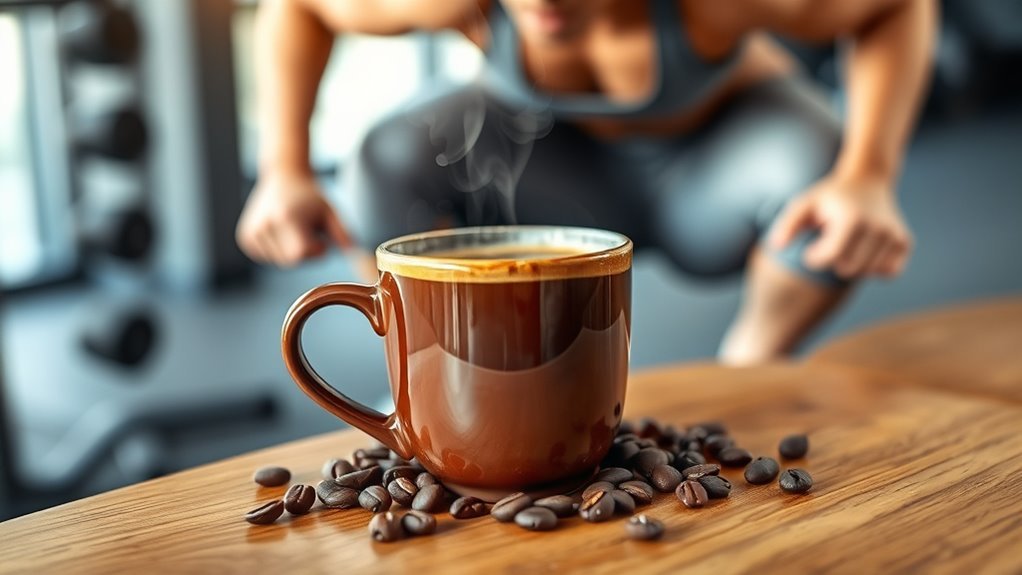How to Optimize Your Workout With Coffee
To optimize your workout with coffee, consume it 30 to 60 minutes before exercising for a boost in energy and focus. Aim for a caffeine dosage of 3 to 6 mg per kilogram of body weight and balance your intake with water to stay hydrated. Following your workout, a cup of coffee can enhance recovery and reduce muscle soreness, especially when paired with carbohydrates. There’s much more to explore about timing and incorporation, so keep going!
The Science Behind Caffeine and Exercise
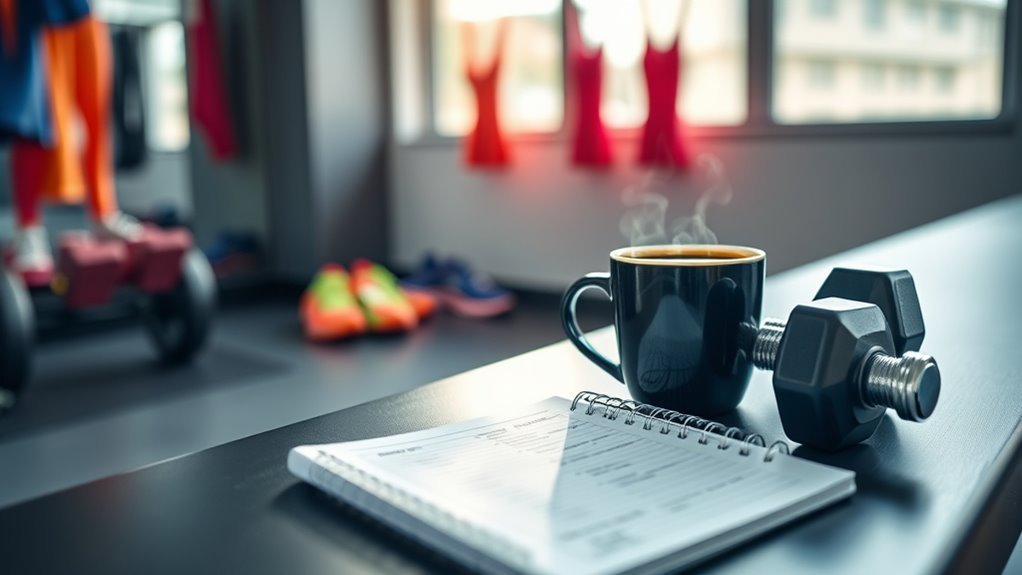
Caffeine is one of the most researched substances in the fitness world, and studies consistently show that it can enhance your workout performance. When you consume caffeine, it’s quickly absorbed into your bloodstream, stimulating your central nervous system. This boost in caffeine metabolism can lead to increased energy levels, allowing you to push harder during workouts. Research indicates that caffeine can improve your exercise performance by reducing perceived effort, meaning you can tackle more intense sessions without feeling as fatigued. Additionally, it may enhance focus and concentration, helping you stay mentally sharp. So, if you’re looking to elevate your workouts, consider incorporating caffeine into your routine for that extra edge, giving you the freedom to reach your fitness goals more effectively.
Benefits of Caffeine for Endurance
When you’re looking to boost your endurance during long workouts, adding caffeine to your regimen can be a game-changer. Research shows that caffeine enhances endurance performance by improving your body’s caffeine metabolism, allowing you to push through fatigue. Here are some key benefits:
Boost your endurance with caffeine; it enhances performance and helps you push through fatigue during long workouts.
- Increases time to exhaustion, letting you go further
- Enhances fat oxidation, helping your body use fat for fuel
- Reduces perceived exertion, making tough workouts feel easier
- Improves recovery times, so you’re ready for your next session
How Caffeine Improves Focus and Mental Clarity
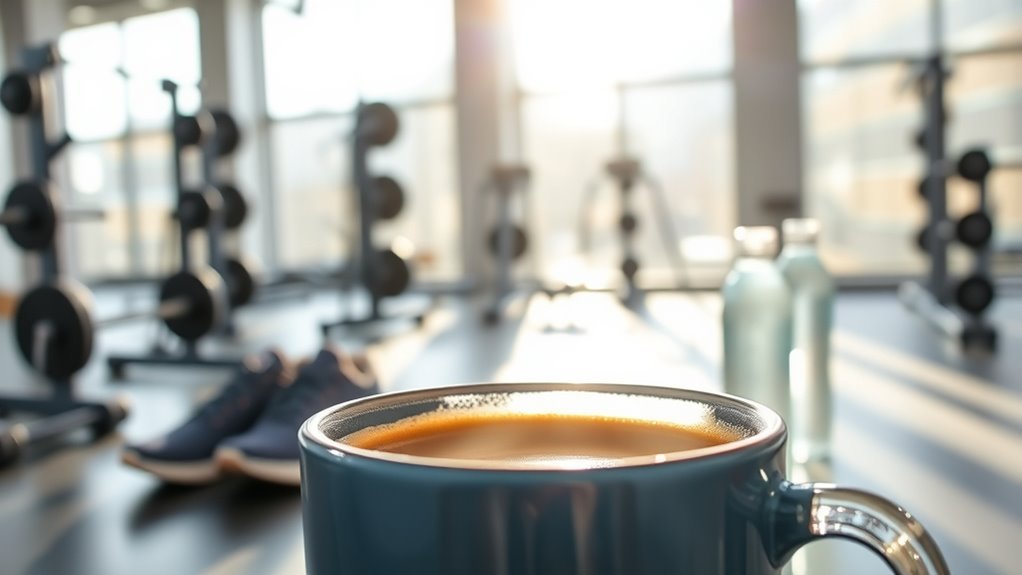
While endurance is essential for physical performance, mental focus plays an equally important role in achieving your fitness goals. Caffeine is a powerful ally in sharpening your concentration and enhancing mental performance. Research shows that caffeine can increase alertness and reduce the perception of effort, allowing you to push through challenging workouts. By elevating your caffeine concentration, you can experience improved cognitive function, helping you stay engaged and motivated during training. This mental clarity can make a significant difference, especially during high-intensity sessions or when you’re feeling fatigued. So, consider incorporating a cup of coffee into your pre-workout routine to boost your focus and release your full potential. Embrace the freedom that comes with a sharper mind in your fitness journey!
Ideal Timing for Your Coffee Intake
To maximize the benefits of coffee before hitting the gym, timing your intake is essential. Consuming caffeine at the right moment can greatly enhance your performance. Here’s what you need to know about pre workout and post workout timing:
Maximize your workout with coffee by timing your intake for optimal energy and performance.
- Pre Workout Timing: Aim to drink your coffee about 30 to 60 minutes before your workout for ideal energy and focus.
- Post Workout Timing: If you enjoy coffee after exercising, consider having it 30 to 60 minutes post workout to aid recovery.
- Hydration: Don’t forget to hydrate! Coffee can be dehydrating, so balance it with water.
- Personal Preference: Everyone’s different; experiment to find what timing works best for you!
Recommended Caffeine Dosage for Workouts
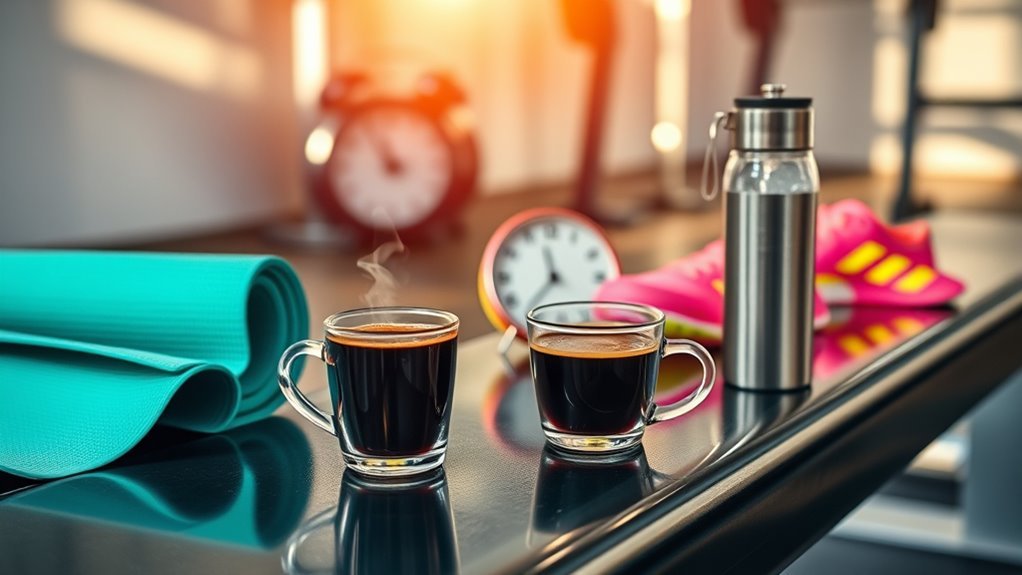
Finding the right caffeine dosage for your workouts can greatly enhance your performance. Research suggests that 3 to 6 mg of caffeine per kilogram of body weight is ideal, but individual tolerance can vary widely. Timing your coffee intake about 30 to 60 minutes before exercising can help you maximize its benefits.
Ideal Caffeine Amount
When it comes to optimizing your workout, understanding the ideal caffeine amount can make a significant difference in your performance. The best dosage can vary based on your caffeine sensitivity, but generally, aiming for 3-6 mg per kilogram of body weight is effective. Here are some tips to guide you:
- Start low and assess your tolerance.
- Experiment with different coffee types and strengths.
- Monitor your energy levels and performance closely.
- Stay hydrated to counteract caffeine’s diuretic effects.
Finding the right balance lets you harness caffeine’s benefits, enhancing endurance and focus during workouts. Just remember, what works for you might not work for someone else, so listen to your body and adjust accordingly.
Timing for Best Effects
Timing plays an essential role in maximizing the benefits of caffeine for your workouts. For ideal pre workout timing, aim to consume your coffee about 30 to 60 minutes before hitting the gym. This allows the caffeine to peak in your bloodstream, enhancing your endurance and focus during your session. A dosage of about 3-6 mg of caffeine per kilogram of body weight is often recommended, but adjust according to your own needs.
On the flip side, post workout timing matters too. While caffeine isn’t as significant after your session, having a cup may aid in recovery. It can help replenish glycogen stores when paired with carbs. So, strategically timing your caffeine can elevate your workout experience and recovery!
Individual Tolerance Variations
Everyone’s caffeine tolerance varies, making it essential to tailor your intake for ideal workout performance. Understanding your individual tolerance and caffeine sensitivity can help you maximize the benefits while minimizing side effects. Here are some tips to take into account:
- Start with a lower dose (around 3 mg/kg) to gauge your reaction.
- Gradually increase your intake if you feel comfortable and don’t experience jitters.
- Pay attention to how caffeine affects your energy and focus during workouts.
- Stay hydrated, as caffeine can have a diuretic effect.
Coffee vs. Other Caffeinated Beverages
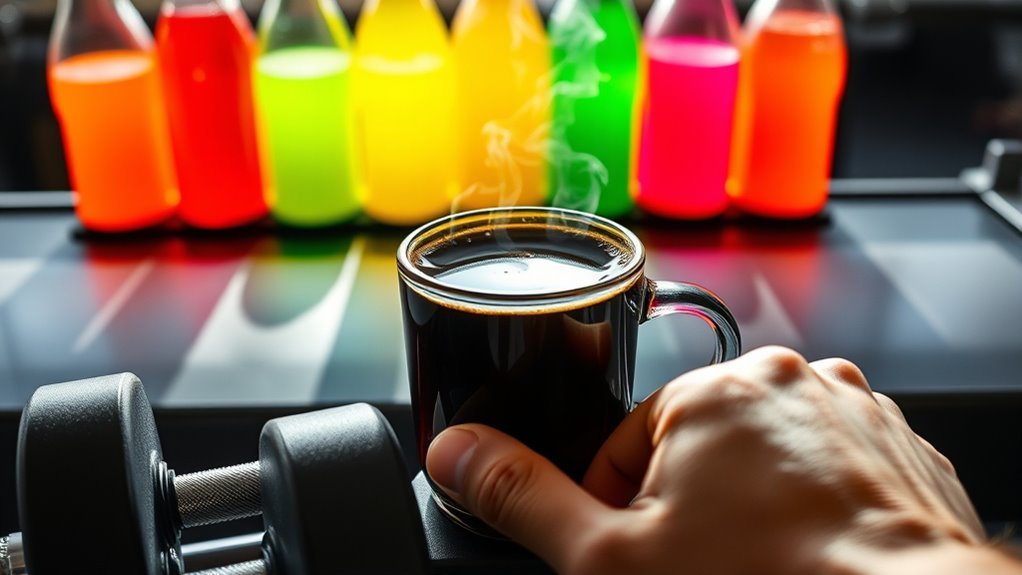
When it comes to choosing a caffeinated beverage for your workout, understanding caffeine content is key. While coffee offers a solid dose of caffeine, other options like energy drinks or teas can vary greatly in potency and health benefits. Timing your caffeine intake can also affect your performance, so let’s compare these choices to find what works best for you.
Caffeine Content Comparison
Coffee often stands out as one of the most popular sources of caffeine, but how does it stack up against other caffeinated beverages? To help you make informed choices, here’s a quick caffeine content comparison:
- Brewed Coffee: About 95 mg per 8 oz.
- Espresso: Roughly 63 mg per 1 oz, showcasing its espresso strength.
- Energy Drinks: Can vary widely, averaging around 80 mg per 8 oz.
- Black Tea: Approximately 47 mg per 8 oz.
These figures show that while coffee provides a solid caffeine kick, other sources can offer significant amounts too. By understanding these caffeine sources, you’ll be better equipped to optimize your workout and enjoy your favorite beverages responsibly.
Health Benefits Overview
While you might think of caffeine solely as a performance enhancer, it also offers a range of health benefits that can vary between coffee and other caffeinated beverages. Coffee is rich in antioxidants, which can help reduce inflammation and lower the risk of chronic diseases. On the other hand, energy drinks often contain added sugars and artificial ingredients that may pose health risks. When selecting your caffeine sources, consider your workout types and personal preferences. If you’re looking for a clean boost, coffee might be your best bet. However, if you enjoy variety, other caffeinated beverages can still provide benefits, but it’s important to be mindful of their ingredients. Ultimately, choose what aligns with your health goals and lifestyle.
Timing for Optimal Effects
To maximize the benefits of caffeine during your workouts, it’s essential to take into account the timing of your intake. The right timing can make all the difference, especially when comparing coffee to other caffeinated beverages.
- Pre workout timing: Aim for 30-60 minutes before your workout to boost energy and focus.
- Post workout timing: Consider a light caffeine source for recovery, but avoid excessive amounts that could hinder sleep.
- Hydration: Balance your coffee with water to stay hydrated.
- Personal preference: Experiment with different caffeinated drinks to find what fuels you best.
Understanding when to consume caffeine can enhance your workout experience and help you reach your fitness goals more effectively.
The Role of Hydration When Consuming Caffeine
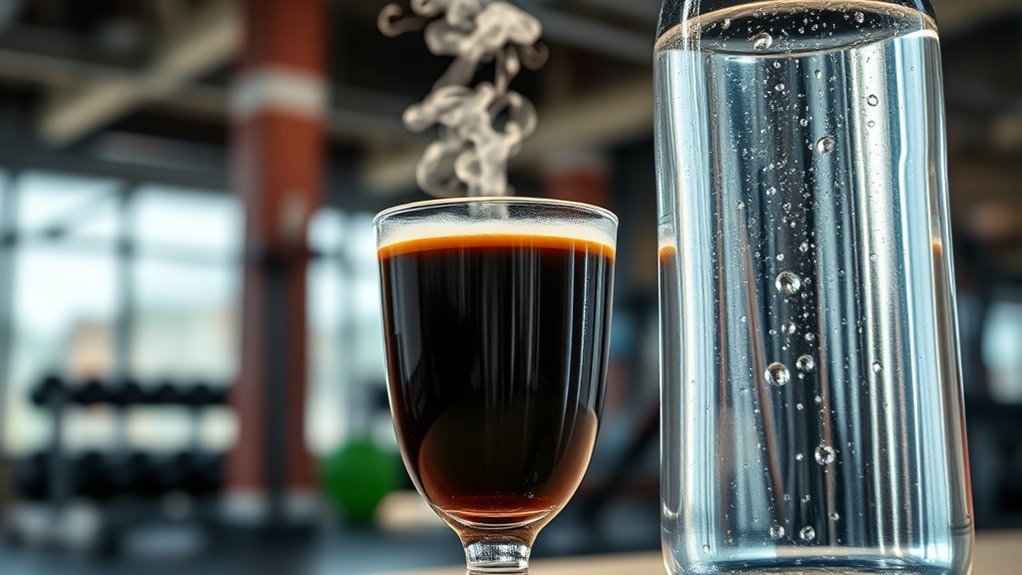
Although caffeine can enhance your workout performance, it’s essential to pay attention to your hydration levels. When you consume coffee, it can act as a mild diuretic, potentially affecting your hydration balance. To counteract this, make sure you’re drinking enough water before, during, and after your workout. Proper hydration not only supports your overall performance but also aids in electrolyte management, which is vital for muscle function and recovery. If you’re sweating heavily, consider electrolyte-rich beverages to replenish lost minerals. By keeping your hydration in check while enjoying your coffee, you’ll maximize its benefits without compromising your workout. Remember, a well-hydrated body is more resilient and ready to tackle any challenge you throw at it.
Coffee and Post-Workout Recovery
After an intense workout, incorporating coffee into your post-recovery routine can offer surprising benefits. Research suggests that caffeine can enhance recovery strategies and aid in muscle repair. Here’s how coffee can help you bounce back:
Incorporating coffee into your post-workout routine may boost recovery and muscle repair.
- Reduced Muscle Soreness: Caffeine may alleviate post-exercise discomfort, making it easier to stay active.
- Improved Glycogen Replenishment: Coffee can assist in restoring energy levels more effectively when paired with carbohydrates.
- Enhanced Focus: The caffeine boost can keep your mind sharp as you recover, prepping you for your next workout.
- Mood Booster: Enjoying a cup can elevate your spirits, making recovery feel less like a chore.
Potential Side Effects of Caffeine
While coffee can boost your workout, it’s important to be aware of potential side effects of caffeine. You might experience an increased heart rate, jitters, or even anxiety if you consume too much. Additionally, caffeine can disrupt your sleep patterns, affecting your recovery and performance.
Increased Heart Rate
When you enjoy a cup of coffee before your workout, you might experience an increased heart rate, which can be both a benefit and a potential side effect of caffeine. This rise in heart rate is often linked to improved performance, but it’s important to be aware of how your body reacts.
- It can enhance your heart rate variability, improving your body’s adaptability.
- Increased heart rate may boost your energy levels, helping you push through tough workouts.
- Keep an eye on your caffeine metabolism; everyone processes caffeine differently.
- If you’re new to pre-workout coffee, start with a small amount to gauge how your body responds.
Listen to your body, and enjoy the freedom that comes with knowing how caffeine affects your workout!
Jitters and Anxiety
Although coffee can enhance your workout, it can also lead to jitters and anxiety, especially if you consume too much caffeine. If you’re sensitive to caffeine, even a small amount can trigger feelings of restlessness or nervousness. To enjoy the benefits without the downsides, it’s vital to monitor your intake and understand your personal caffeine sensitivity. For effective anxiety management, consider timing your coffee consumption; try having it about 30 minutes before your workout for ideal performance. Additionally, pairing coffee with hydration can help mitigate jittery feelings. Remember, everyone’s tolerance differs, so listen to your body. Finding that sweet spot allows you to harness coffee’s energy-boosting effects while keeping anxiety at bay, giving you the freedom to focus on your fitness goals.
Sleep Disruption Risks
Caffeine can be a double-edged sword; on one hand, it boosts your energy for workouts, but on the other, it can disrupt your sleep patterns. If you’re sensitive to caffeine, you might find that even a small amount can negatively impact your sleep quality. Here are some things to reflect upon:
- Timing: Avoid caffeine in the late afternoon or evening.
- Dosage: Pay attention to how much you’re consuming; moderation is key.
- Personal Sensitivity: Everyone’s caffeine sensitivity varies, so listen to your body.
- Withdrawal Effects: Reducing caffeine can initially disrupt sleep, but long-term benefits may outweigh the temporary discomfort.
Tips for Incorporating Coffee Into Your Fitness Routine
How can you effectively harness the power of coffee to enhance your workouts? Start by choosing the right coffee types, like espresso or cold brew, which pack a caffeine punch without excess sugar. Aim to consume your coffee about 30 to 60 minutes before exercising for ideal results. If you’re sensitive to caffeine, consider caffeine alternatives like green tea or matcha, which can provide a gentler boost. Also, pay attention to your hydration; coffee can be diuretic, so balance it with water. Experiment with different brewing methods to find what energizes you best, and don’t forget to listen to your body. With these tips, you can enjoy the freedom of an energized workout routine that keeps you motivated and feeling great.
Frequently Asked Questions
Can I Drink Coffee Before Every Workout?
Yes, you can drink coffee before every workout, but it depends on your caffeine sensitivity. Many people experience pre-workout benefits from caffeine, like increased energy and focus. However, if you’re sensitive to caffeine, it might lead to jitters or anxiety. Experiment with timing and dosage to find what works best for you. Enjoy the freedom to enhance your workouts, but listen to your body and adjust as needed for ideal results.
Does Coffee Affect Sleep Quality After Evening Workouts?
If you’re working out in the evening, coffee can indeed affect your sleep quality. Caffeine metabolism varies from person to person, but consuming it too close to bedtime might shorten sleep duration. Research suggests that caffeine can delay the onset of sleep and reduce overall restfulness. If you crave that energy boost, consider timing your coffee earlier in the day to enjoy a good night’s sleep and wake up refreshed for tomorrow’s activities.
Is Decaf Coffee Beneficial for Workouts?
Imagine soaring through your workout like a superhero! While decaf coffee won’t launch you into the stratosphere, it can still offer some decaf benefits. It may improve workout performance by providing hydration and a comforting ritual without the jitters that regular coffee can cause. Plus, it’s a great way to enjoy your favorite beverage without disrupting your sleep. So, if you love coffee, enjoy your decaf guilt-free before hitting the gym!
Can I Use Coffee as a Meal Replacement for Energy?
You might be tempted to use coffee as a meal replacement for energy, but it’s not a sustainable option. While coffee can boost your energy levels temporarily, it lacks essential nutrients your body needs. Relying solely on coffee can lead to fatigue and poor performance later. Instead, consider using coffee as an energizing supplement alongside balanced meals to maximize its benefits while fueling your body properly for peak performance and well-being.
Are There Any Coffee Brands Specifically Recommended for Athletes?
When it comes to coffee brands for athletes, you might be surprised that over 60% of runners consume coffee before a race for its performance benefits. Brands like Tailwind and GU offer performance blends specifically designed to enhance endurance, while others like RISE provide recovery drinks enriched with coffee for post-workout benefits. Choosing the right coffee can elevate your training, so consider those tailored for athletic needs to boost your performance and recovery.
